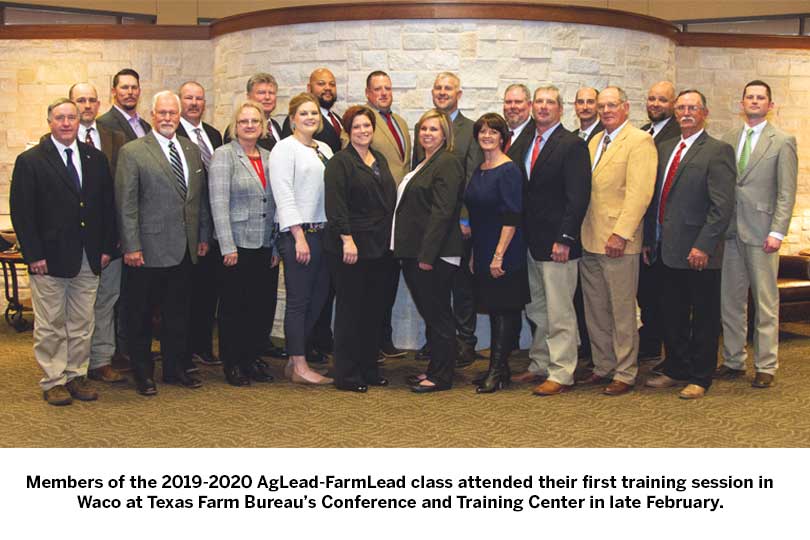By Julie Tomascik
Editor
Strong agricultural leadership can make a difference in the field and beyond the fence row. Members of Texas Farm Bureau’s (TFB) new AgLead-FarmLead class will develop and hone their leadership skills to help benefit Texas agriculture and their communities.
“AgLead-FarmLead is an advanced agricultural leadership program designed to enhance and develop skills and traits needed for effective and prepared agricultural leaders,” Jamie Gipe, TFB director of Membership and Special Projects, said. “Through the program, graduates are able to provide a viable agricultural voice at whatever leadership table they find themselves.”
The current class of 21 TFB members from across the state includes: Kristin Anderson, Buda; John Evans, Little River; Steve Evans, Coleman; Meagan Ezzell, Nacogdoches; Kacy Frazier, Chapman Ranch; Richard Fry, Bellville; Justin Hannsz, Stephenville; Chase Holub, Blessing; Jim Hudson, Lawn; Charlotte Kneupper, Boerne; Frank Massey, Mineral; Austin Miles, Sadler; Winston Millican, San Saba; Matt Moore, Shamrock; Brian Nielsen, Lockhart; J.T. Pratt, Dublin; Sam Scott, Murchison; Justin Stoerner, Lockney; Todd Straley, Plainview; Isaac Sulemana, Edinburg; and Adreinne Synatschk, Olton.
In previous years, the programs were separate. AgLead was the leadership development program for farmers and ranchers ages 25-40, and FarmLead participants were farmers and ranchers ages 40 and older.
Both groups previously shared sessions together, and the interaction in those sessions led to merging the programs to enhance leadership development and individual experiences.
“Leadership is a journey that requires intentional and continuous effort on behalf of the individual,” Gipe said. “AgLead-FarmLead gives participants the opportunity for training in essential leadership skills and identified traits that will assist them in making the most of their leadership journey.”
Throughout the two-year program, members will travel across Texas, the country and the world to discover agriculture and leadership from a new perspective.
They’ll also develop a deeper understanding of communication, public policy, regulatory activities, political advocacy and more, according to Gipe.
“As we progress through the program, their confidence and understanding will grow,” he said. “Graduates will be able to use that in future leadership roles and activities.”
Because the program cultivates agricultural leaders for generations to come.
“True leadership begins from the ground up. The future of agriculture is in their hands. They just need the right tools to cultivate it,” Gipe said.
But strong agricultural leadership isn’t left out in the field.
Through the program, AgLead-FarmLead members learn the intricacies of agribusinesses, as well as the political and regulatory processes that influence farm and ranch business decisions at the state and national levels.
“From the farm gate to the Capitol steps and everywhere in between, AgLead-FarmLead helps these future leaders reach their full potential,” Gipe said.
They’ll take what they learn from the sessions and each other even further—to the state legislature, county courtrooms, state committees and local organizations and boards—pulling a chair up to a variety of leadership tables.
The program’s seven sessions include stops in Waco, Austin, the West Coast, Texas Panhandle, Rio Grande Valley, Washington, D.C. and an international trip.
Time is a priority investment for the program and a limited commodity for farmers and ranchers. But, Gipe said, it’s time well spent.
“A byproduct of the program is the relationships and networks that they will establish with each other and with others across the nation,” Gipe said. “AgLead-FarmLead participants are going, doing, seeing and connecting with people and places they may never have had the chance to do by themselves. It is truly an opportunity of a lifetime to experience.”
To learn more about the program, visit texasfarmbureau.org/aglead-farmlead.

